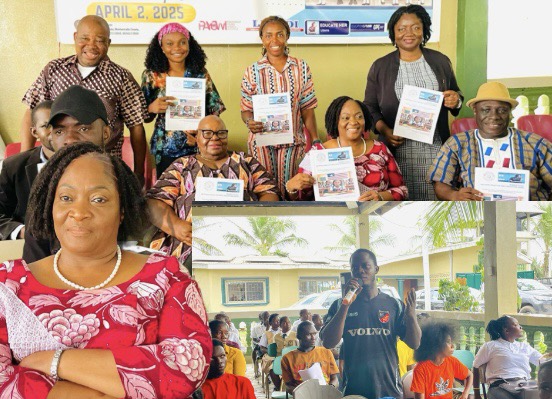“EDUCATE HER COALITION” AND PARTNERS HOST GIRLS EDUCATION POLICY DIALOGUE

April 2, 2025
By Laymah Kollie
Careysburg Margibi: “Educate Her Coalition” and partner, Liberia Media for Democratic Initiative have concluded a one-day dialogue intended to raise awareness about Girls’ Education Policy.
The objective of the dialogue is to enhance the implementation and monitoring of the National Policy for Girls’ Education (NPGE 2021-2026) and its three-year strategic plan. The project is focused on increasing commitment of policymakers and stakeholders, and to explore how everyone can make meaningful contributions to enhance Liberia’s educational system and as well to ensure that educational stakeholders are accountable to the sector and can increase citizens’ knowledge of the policy, enabling them to take action to ensure more girls are in school.
The forum, titled “Empowering Local Voices in the Promotion of Girls’ Education in Liberia,” brought the National Girls’ Education Policy to the attention of students for the very first time to look at the implementation and monitoring aspect of the National Policy for Girls’ Education.
The Educate Her initiative under the theme, “Promoting Gender Equality and Equity in Education,” is currently led by two women-led organizations under the banner of the Educate Her Coalition.
The organizations include Helping Our People Excel (HOPE) and Paramount Young Women’s Initiative. The project is part of the Education Out Loud initiative, funded by the Global Partnership for Education (GPE) through Oxfam Denmark. It is a stand-alone project focused on ensuring the effective implementation of the National Policy on Girls’ Education, specifically for girls and women.
Providing an Overview of the activity, Madam Hawa Wilson, Program Coordinator of the Paramount Young Women’s Initiative, stated the policy was formulated in 2006 but has had limited publicity, which may explain the lack of attention from relevant Stakeholders. She emphasized the policy’s importance to girls, women, men, and the public.
Hawa believes that extensive publicity will help accelerate the implementation of a policy. “2006—how many of us in this room are knowledgeable about that? What does the policy say in terms of budgetary allocation?” We are here today to raise awareness about the importance of girls’ education and promote gender equality and equity in the educational sector.
Statistics show that 122 million girls are out of school globally, 4 out of every 10 girls don’t attend school annually, and 50 million are still unable to read and write. Nine out of ten girls lack STEM education.
The activity comprises a panel discussion, creating an opportunity for policymakers from diverse backgrounds to share insights on challenges, prospects, and ways to achieve girls’ education in Liberia. The Former Vice President of the Republic of Liberia served as a panelist and spoke on the challenges and prospects of girls’ and women’s education and empowerment, alongside governance and political will in Liberia.
The former VP said Girls do not make much effort to obtain scholarship opportunities in public spaces, leaving their counterparts to dominate these opportunities. She then encouraged girls to stand up and obtain the space at every opportunity. Girls must dream big dreams, prepare to follow their life’s trajectory, and never give up. Girls have more capacity if they believe in themselves.”,
Speaking on the role of the Government in girls’ education, the former Vice President noted that the Government is responsible for ensuring that the education system is up-to-date and accessible, and that rules and regulations are followed.
At the same time, Former Chief Justice Cllr. Frances Johnson Allison, speaking on legal hurdles and prospects for girls’ education in Liberia, mentioned that the country doesn’t lack money; the problem is managing its resources. She acknowledged the ill-implementation of laws and policies in Liberia. Furthermore, Mr. Abba G. Karnga, Assistant Minister for Basic Education at the Ministry of Education, elaborated on the current state of girls’ and women’s education in Liberia and the Government’s commitment to addressing it.
In his speech, Minister Karnga acknowledged the vast challenges facing the Liberian educational system and the difficulties in achieving girls’ education. According to the minister, a significant portion of the budget allocation to the ministry covers expenditure, with a smaller portion allocated to address the various programs and problems within the sector.
He confirmed the Ministry’s inability to achieve the 0.1% allotment to girls’ education as prescribed in the policy. Minister Karnga said that while the Government is battling these challenges, plans are underway to increase allocations for girls’ education in the country.
Meanwhile, Representative Nya Flomo of Nimba County, Chairman of the Education Committee in the House, emphasized the Ministry’s challenges in adequately implementing the allocated resources. Rep. Nya told the gathering that while the Legislature allocates funds to the Ministry of Education to implement its programs, there are often instances of misappropriation of funds, and sometimes, no performance reports are submitted.
Participants applauded the “Educate Her Coalition” for organizing the event. They referred to the dialogue as an opportunity to learn more about the Girl’s Education Policy.
The National Policy on Girls’ Education (NGE 2021-2026) aims to provide access to affordable and quality education, promoting gender equity and equality throughout the educational system. The primary purpose of the NGE is to establish guiding principles in Liberia’s efforts to eliminate gender-based violence and identify priorities for government and stakeholder action.
Over the years, the national budget allocated to education has fluctuated, with no specific funds set aside earmarked for girls’ education programming or the effective implementation of the National Policy on Girls’ Education.
However, recent trends in financial investments in girls’ Education in Liberia show a comprehensive and multi-sectoral approach. While progress is evident, significant challenges remain, particularly in ensuring sustainable funding, allocating funds effectively, and tracking education expenditures accurately. Inadequate and inconsistent funding for girls’ education programs limits their reach and impact, particularly in marginalized and rural areas.



